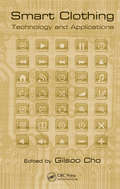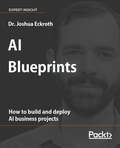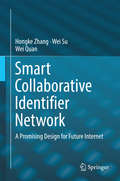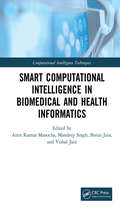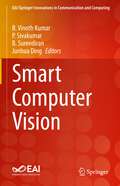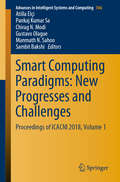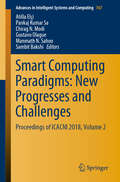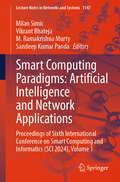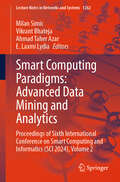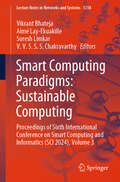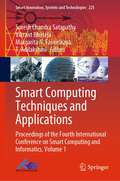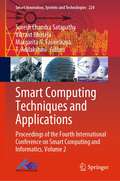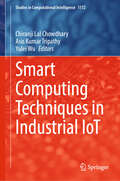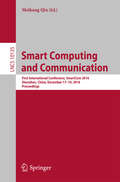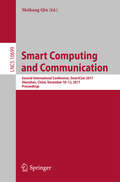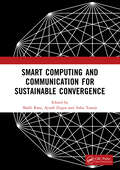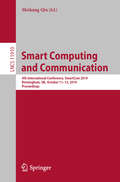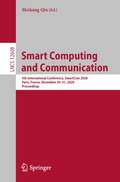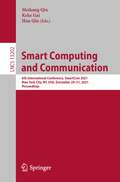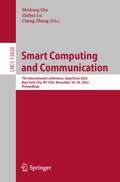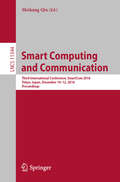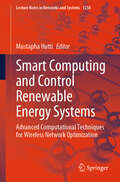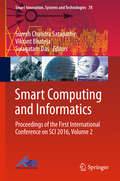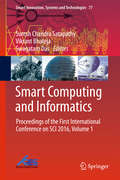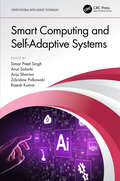- Table View
- List View
Smart Clothing: Technology and Applications (Human Factors and Ergonomics)
by Gilsoo ChoGPS-embedded clothing for finding children or skiers when they are lost, bio-monitoring smart shirts, and vests that monitor a patient's vital signs are no longer science fiction but science fact. It is quite likely that within 20 or 30 years, computers, telephones, and televisions will be a part of our intimate clothing. Covering the whole design
Smart Code
by Joshua EckrothSmart Code can be read and understood by programmers and students without practical AI experience, since it is meant as an introduction to AI in practice. By the same token, some AI technical reading or AI algorithm implementation experience would be most welcome, whether as part of an undergraduate or a business software project. Further, knowledge and experience of Python programming is required to understand the code in this book.
Smart Collaborative Identifier Network
by Wei Quan Hongke Zhang Wei SuThis book introduces a promising design for future Internet, the Smart Collaborative Identifier NETwork (SINET). By examining cutting-edge research from around the world, it is the first book to provide a comprehensive survey of SINET, including its basic theories and principles, a broad range of architectures, protocols, standards, and future research directions. For further investigation, the book also provides readers an experimental analysis of SINET to promote further, independent research. The second part of the book presents in detail key technologies in SINET such as scalable routing, efficient mapping systems, mobility management and security issues. In turn, the last part presents various implementations of SINET, assessing its merits. The authors believe SINET will greatly benefit researchers involved in designing future Internet thanks to its high degree of flexibility, security, manageability, mobility support and efficient resource utilization.
Smart Computational Intelligence in Biomedical and Health Informatics (Computational Intelligence Techniques)
by Amit Kumar ManochaSmart Computational Intelligence in Biomedical and Health Informatics presents state-of-the-art innovations; research, design, and implementation of methodological and algorithmic solutions to data processing problems, including analysis of evolving trends in health informatics and computer-aided diagnosis. This book describes practical, applications-led research regarding the use of methods and devices in clinical diagnosis, disease prevention, and patient monitoring and management. It also covers simulation and modeling, measurement and control, analysis, information extraction and monitoring of physiological data in clinical medicine and the biological sciences. FEATURES Covers evolutionary approaches to solve optimization problems in biomedical engineering Discusses IoT, Cloud computing, and data analytics in healthcare informatics Provides computational intelligence-based solution for diagnosis of diseases Reviews modelling and simulations in designing of biomedical equipment Promotes machine learning-based approaches to improvements in biomedical engineering problems This book is for researchers, graduate students in healthcare, biomedical engineers, and those interested in health informatics, computational intelligence, and machine learning.
Smart Computer Vision (EAI/Springer Innovations in Communication and Computing)
by P. Sivakumar B. Vinoth Kumar B. Surendiran Junhua DingThis book addresses and disseminates research and development in the applications of intelligent techniques for computer vision, the field that works on enabling computers to see, identify, and process images in the same way that human vision does, and then providing appropriate output. The book provides contributions which include theory, case studies, and intelligent techniques pertaining to computer vision applications. The book helps readers grasp the essence of the recent advances in this complex field. The audience includes researchers, professionals, practitioners, and students from academia and industry who work in this interdisciplinary field. The authors aim to inspire future research both from theoretical and practical viewpoints to spur further advances in the field.
Smart Computing Paradigms: Proceedings of ICACNI 2018, Volume 1 (Advances in Intelligent Systems and Computing #766)
by Manmath N. Sahoo Pankaj Kumar Sa Sambit Bakshi Gustavo Olague Atilla Elçi Chirag N. ModiThis two-volume book focuses on both theory and applications in the broad areas of communication technology, computer science and information security. It brings together contributions from scientists, professors, scholars and students, and presents essential information on computing, networking, and informatics. It also discusses the practical challenges encountered and the solutions used to overcome them, the goal being to promote the “translation” of basic research into applied research, and of applied research into practice. The works presented here will also demonstrate the importance of basic scientific research in a range of fields.
Smart Computing Paradigms: Proceedings of ICACNI 2018, Volume 2 (Advances in Intelligent Systems and Computing #767)
by Manmath N. Sahoo Pankaj Kumar Sa Sambit Bakshi Gustavo Olague Atilla Elçi Chirag N. ModiThis two-volume book focuses on both theory and applications in the broad areas of communication technology, computer science and information security. It brings together contributions from scientists, professors, scholars and students, and presents essential information on computing, networking, and informatics. It also discusses the practical challenges encountered and the solutions used to overcome them, the goal being to promote the “translation” of basic research into applied research, and of applied research into practice. The works presented here will also demonstrate the importance of basic scientific research in a range of fields.
Smart Computing Paradigms: Proceedings of Sixth International Conference on Smart Computing and Informatics (SCI 2024), Volume 1 (Lecture Notes in Networks and Systems #1147)
by Vikrant Bhateja Sandeep Kumar Panda Milan Simic M. Ramakrishna MurtyThis book presents best-selected papers presented at the 6th International Conference on Smart Computing and Informatics (SCI 2024), held at the Department of Computer Science and Engineering, Anil Neerukonda Institute of Technology & Sciences (ANITS), Visakhapatnam, India, during 19–20 April 2024. It presents advanced and multidisciplinary research towards the design of smart computing and informatics. The theme is on a broader front and focuses on various innovation paradigms in system knowledge, intelligence and sustainability that may be applied to provide realistic solutions to varied problems in society, environment and industries. The scope is also extended towards the deployment of emerging computational and knowledge transfer approaches, optimizing solutions in various disciplines of science, technology and healthcare. The work is published in three volumes.
Smart Computing Paradigms: Proceedings of Sixth International Conference on Smart Computing and Informatics (SCI 2024), Volume 2 (Lecture Notes in Networks and Systems #1262)
by Ahmad Taher Azar Vikrant Bhateja Milan Simic E. Laxmi LydiaThis book presents best-selected papers presented at 6th International Conference on Smart Computing and Informatics (SCI 2024), held at Department of Computer Science and Engineering, Anil Neerukonda Institute of Technology & Sciences (ANITS), Visakhapatnam, India, during 19 – 20 April 2024. It presents advanced and multidisciplinary research toward the design of smart computing and informatics. The theme is on a broader front and focuses on various innovation paradigms in system knowledge, intelligence and sustainability that may be applied to provide realistic solutions to varied problems in society, environment and industries. The scope is also extended toward the deployment of emerging computational and knowledge transfer approaches, optimizing solutions in various disciplines of science, technology and healthcare. The work is published in three volumes.
Smart Computing Paradigms: Proceedings of Sixth International Conference on Smart Computing and Informatics (SCI 2024), Volume 3 (Lecture Notes in Networks and Systems #1318)
by Aimé Lay-Ekuakille Vikrant Bhateja V. V. S. S. S Chakravarthy Suresh LimkarThe proceeding presents best selected papers presented at 6th International Conference on Smart Computing and Informatics (SCI 2024), held at Department of Computer Science and Engineering, Anil Neerukonda Institute of Technology & Sciences (ANITS), Visakhapatnam, India, during 19 – 20 April 2024. It presents advanced and multi-disciplinary research towards the design of smart computing and informatics. The theme is on a broader front focuses on various innovation paradigms in system knowledge, intelligence and sustainability that may be applied to provide realistic solutions to varied problems in society, environment and industries. The scope is also extended towards the deployment of emerging computational and knowledge transfer approaches, optimizing solutions in various disciplines of science, technology and healthcare. The work is published in three volumes.
Smart Computing Techniques and Applications: Proceedings of the Fourth International Conference on Smart Computing and Informatics, Volume 1 (Smart Innovation, Systems and Technologies #225)
by Margarita N. Favorskaya Suresh Chandra Satapathy Vikrant Bhateja T. AdilakshmiThis book presents best selected papers presented at the 4th International Conference on Smart Computing and Informatics (SCI 2020), held at the Department of Computer Science and Engineering, Vasavi College of Engineering (Autonomous), Hyderabad, Telangana, India. It presents advanced and multi-disciplinary research towards the design of smart computing and informatics. The theme is on a broader front which focuses on various innovation paradigms in system knowledge, intelligence and sustainability that may be applied to provide realistic solutions to varied problems in society, environment and industries. The scope is also extended towards the deployment of emerging computational and knowledge transfer approaches, optimizing solutions in various disciplines of science, technology and health care.
Smart Computing Techniques and Applications: Proceedings of the Fourth International Conference on Smart Computing and Informatics, Volume 2 (Smart Innovation, Systems and Technologies #224)
by Margarita N. Favorskaya Suresh Chandra Satapathy Vikrant Bhateja T. AdilakshmiThis book presents best selected papers presented at the 4th International Conference on Smart Computing and Informatics (SCI 2020), held at the Department of Computer Science and Engineering, Vasavi College of Engineering (Autonomous), Hyderabad, Telangana, India. It presents advanced and multi-disciplinary research towards the design of smart computing and informatics. The theme is on a broader front which focuses on various innovation paradigms in system knowledge, intelligence and sustainability that may be applied to provide realistic solutions to varied problems in society, environment and industries. The scope is also extended towards the deployment of emerging computational and knowledge transfer approaches, optimizing solutions in various disciplines of science, technology and health care.
Smart Computing Techniques in Industrial IoT (Studies in Computational Intelligence #1172)
by Yulei Wu Chiranji Lal Chowdhary Asis Kumar TripathyThe book provides a conceptual framework and roadmap for applications and research trends in Smart Computing Techniques in Industrial IoT. This volume aims to provide information on emerging fields of intelligent computing techniques with a particular emphasis on industrial IoT development and applications of artificial intelligence, deep learning techniques, computational intelligence methods, the Internet of Medical Things (IoMT), optimization techniques, blockchain, and cloud computing. It will be a useful guide for undergraduate and postgraduate students studying artificial intelligence, deep learning, industry 4.0, industry 5.0, smart cities, machine learning, deep learning computational intelligence, and edge/cloud computing.
Smart Computing and Communication
by Meikang QiuThis book constitutes the proceedings of the First International Conference on Smart Computing and Communication, SmartCom 2016, held in Shenzhen, China, in December 2016. The 59 papers presented in this volume were carefully reviewed and selected from 210 submissions. The conference focuses on both smart computing and communications fields and aims to collect recent academic work to improve the research and practical applications.
Smart Computing and Communication
by Meikang QiuThis book constitutes the proceedings of the First International Conference on Smart Computing and Communication, SmartCom 2016, held in Shenzhen, China, in December 2016. The 59 papers presented in this volume were carefully reviewed and selected from 210 submissions. The conference focuses on both smart computing and communications fields and aims to collect recent academic work to improve the research and practical applications.
Smart Computing and Communication for Sustainable Convergence: Proceedings of the First International Conference on Smart Computing and Communication for Sustainable Convergence (ISCCSC 2024), Punjab, India, October 18th, 2024
by Shalli Rani Ashu Taneja Ayush DograThe proceedings of the first International Conference on Smart Computing and Communication for Sustainable Convergence (ISCCSC 2024) present a rich repository of cutting-edge research on smart computing, artificial intelligence and machine learning.It highlights technological breakthroughs and practical challenges in the field of edge learning, data mining, image processing, smart communications, 5G/6G communication networks, signal processing, wireless sensor networks, antenna systems and imaging. It also explores a wide range of communication paradigms, especially those pertaining to smart cities by delving deeper into smart healthcare, smart transportation and intelligent data processing. The findings are instrumental in combating critical global issues and foster a deeper understanding of the role of AI in shaping the world we live in.This will be a highly valuable guide to researchers, data scientists, practicing professionals and students in the fields of artificial intelligence, machine learning and data processing.
Smart Computing and Communication: 4th International Conference, SmartCom 2019, Birmingham, UK, October 11–13, 2019, Proceedings (Lecture Notes in Computer Science #11910)
by Meikang QiuThis book constitutes the refereed proceedings of the 4th International Conference on Smart Computing and Communications, SmartCom 2019, held in Birmingham, UK, in October 2019. The 40 papers presented in this volume were carefully reviewed and selected from 286 submissions. They focus on both smart computing and communications fields and aimed to collect recent academic work to improve the research and practical application in the field.
Smart Computing and Communication: 5th International Conference, SmartCom 2020, Paris, France, December 29–31, 2020, Proceedings (Lecture Notes in Computer Science #12608)
by Meikang QiuThis book constitutes the proceedings of the 5th International Conference on Smart Computing and Communication, SmartCom 2020, which took place in Paris, France, during December 29-31, 2020.The 30 papers included in this book were carefully reviewed and selected from 162 submissions. The scope of SmartCom 2020 was broad, from smart data to smart communications, from smart cloud computing to smart security. The conference gathered all high-quality research/industrial papers related to smart computing and communications and aimed at proposing a reference guideline for further research.
Smart Computing and Communication: 6th International Conference, SmartCom 2021, New York City, NY, USA, December 29–31, 2021, Proceedings (Lecture Notes in Computer Science #13202)
by Meikang Qiu Keke Gai Han QiuThis book constitutes the proceedings of the 6th International Conference on Smart Computing and Communication, SmartCom 2021, which took place in New York City, USA, during December 29–31, 2021.* The 44 papers included in this book were carefully reviewed and selected from 165 submissions. The scope of SmartCom 2021 was broad, from smart data to smart communications, from smart cloud computing to smart security. The conference gathered all high-quality research/industrial papers related to smart computing and communications and aimed at proposing a reference guideline for further research.* Conference was held online due to the COVID-19 pandemic.
Smart Computing and Communication: 7th International Conference, SmartCom 2022, New York City, NY, USA, November 18–20, 2022, Proceedings (Lecture Notes in Computer Science #13828)
by Meikang Qiu Cheng Zhang Zhihui LuThis book constitutes the proceedings of the 7th International Conference on Smart Computing and Communication, SmartCom 2022, held in New York City, NY, USA, during November 18–20, 2022. The 64 papers included in this book were carefully reviewed and selected from 312 submissions. SmartCom 2023 focus on recent booming developments in Web-based technologies and mobile applications which have facilitated a dramatic growth in the implementation of new techniques, such as cloud computing, edge computing, big data, pervasive computing, Internet of Things, security and privacy, blockchain, Web 3.0, and social cyber-physical systems. The conference gathered all high-quality research/industrial papers related to smart computing and communications and aimed at proposing a reference guideline for further research.
Smart Computing and Communication: Third International Conference, SmartCom 2018, Tokyo, Japan, December 10–12, 2018, Proceedings (Lecture Notes in Computer Science #11344)
by Meikang QiuThis book constitutes the refereed proceedings of the Third International Conference on Smart Computing and Communications, SmartCom 2018, held in Tokyo, Japan, in December 2018. The 45 papers presented in this volume were carefully reviewed and selected from 305 submissions. They focus on topics from smart data to smart communications, as well as smart cloud computing to smart security.
Smart Computing and Control Renewable Energy Systems: Advanced Computational Techniques for Wireless Network Optimization (Lecture Notes in Networks and Systems #1238)
by Mustapha HattiThis essential book bridges the gap between cutting-edge artificial intelligence and the dynamic world of renewable energy systems. Embark on a journey to the forefront of sustainable energy innovation with this groundbreaking collection of research papers and expert insights. Designed for curious minds and industry leaders alike, this comprehensive resource offers: - A deep dive into the latest advancements in smart computing for sustainable energy. - Exploration of AI-driven techniques revolutionizing energy efficiency and management. - Real-world applications showcasing the transformative power of intelligent systems in renewables. - Insights into futuristic energy infrastructures powered by artificial intelligence. - A perfect blend of theoretical foundations and practical implementations. To a seasoned researcher pushing the boundaries of knowledge, a graduate student aspiring to make a mark, or an industry professional staying ahead of the curve, this book is a gateway to the future of energy. Discover how machine learning is reshaping solar forecasting, uncover the potential of autonomous systems in energy storage, and explore the role of AI in crafting smarter, more sustainable cities. From predictive maintenance that ensures uninterrupted power to intelligent control systems optimizing energy generation, this book covers it all. Don't just witness the renewable energy revolution—be part of it. This book equips readers with the knowledge and inspiration to drive innovation in this critical field. It is more than a collection of papers; it is a roadmap to a sustainable future where smart computing and renewable energy converge. Prepare to challenge your assumptions, expand your expertise, and contribute to a greener tomorrow. Order your copy today and position yourself at the vanguard of the smart energy movement!
Smart Computing and Informatics
by Swagatam Das Suresh Chandra Satapathy Vikrant BhatejaThis volume contains 74 papers presented at SCI 2016: First International Conference on Smart Computing and Informatics. The conference was held during 3-4 March 2017, Visakhapatnam, India and organized communally by ANITS, Visakhapatnam and supported technically by CSI Division V - Education and Research and PRF, Vizag. This volume contains papers mainly focused on applications of advanced intelligent techniques to video processing, medical imaging, machine learning, sensor technologies, and network security.
Smart Computing and Informatics: Proceedings of the First International Conference on SCI 2016, Volume 1 (Smart Innovation, Systems and Technologies #77)
by Swagatam Das Suresh Chandra Satapathy Vikrant BhatejaThis volume contains 68 papers presented at SCI 2016: First International Conference on Smart Computing and Informatics. The conference was held during 3-4 March 2017, Visakhapatnam, India and organized communally by ANITS, Visakhapatnam and supported technically by CSI Division V - Education and Research and PRF, Vizag. This volume contains papers mainly focused on smart computing for cloud storage, data mining and software analysis, and image processing.
Smart Computing and Self-Adaptive Systems (Computational Intelligence Techniques)
by Rajesh Kumar Zdzislaw Polkowski Arun Solanki Simar Preet Singh Anju SharmaThe book intends to cover various problematic aspects of emerging smart computing and self-adapting technologies comprising of machine learning, artificial intelligence, deep learning, robotics, cloud computing, fog computing, data mining algorithms, including emerging intelligent and smart applications related to these research areas. Further coverage includes implementation of self-adaptation architecture for smart devices, self-adaptive models for smart cities and self-driven cars, decentralized self-adaptive computing at the edge networks, energy-aware AI-based systems, M2M networks, sensors, data analytics, algorithms and tools for engineering self-adaptive systems, and so forth. Acts as guide to Self-healing and Self-adaptation based fully automatic future technologies Discusses about Smart Computational abilities and self-adaptive systems Illustrates tools and techniques for data management and explains the need to apply, and data integration for improving efficiency of big data Exclusive chapter on the future of self-stabilizing and self-adaptive systems of systems Covers fields such as automation, robotics, medical sciences, biomedical and agricultural sciences, healthcare and so forth This book is aimed researchers and graduate students in machine learning, information technology, and artificial intelligence.
